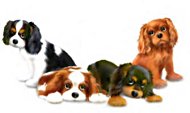SuShine
perm reg'd
Cavalier King Charles
Spaniels
Frequently Asked Questions about Cavaliers
Things to consider before bringing a Cavalier into your life:
* They are the most gentle and loving of all dogs.
* They are the ultimate companion.
* They shed.
* They need to be brushed at least once a week, to keep out the mats.
* Crate training is a benefit, it gives the Cavalier a real place to call
his own, it is not a punishment.
* They must be a house pet and kept inside with the family.
* They do not tolerate extreme heat or cold.
We are asked many questions about our Dogs. Hopefully you will find
the answers below. If you think I should have included some more- just let
me know.
Question: Are they a good family dog?
Answer: Yes, the Cavalier is a wonderful family companion. The Cavalier does not require a lot of exercise but they do enjoy a good walk or game of ball. They do get along with all types of animals and all ages of people. When bred responsibly, they are very smart, agile will alert when strangers are present. As with any breed, only those of stable, healthy mind and body should be bred. Sometimes this is not always the way, so be very selective when choosing a breeder, even if you must wait a lengthy time. Cavaliers are a Sporting toy dog, so chasing butterflies can be a happy pastime. They do love agility providing they are in healthy fit condition. Fenced yard are best for security.
Question: Are they good with children?
Answer: Yes, I feel Cavaliers are very good with children. Having said that I also feel strongly that children should NOT be left unattended with ANY BREED of dog. Think about it, neither your child, nor your dog has the capacity to take care of himself or herself, why would you think they can take care of each other? Cavaliers will sometimes remove themselves when toddlers are playing or chasing them especially if they are not accustomed to young children.
Questions: Do they shed a lot, and are they easy to keep care of?
Answer: A complete brushing
once a week will keep your dog looking his
best. Regular brushing also keeps bathing to a minimum and a bath once every
1-2 months is more than ample. Like all dogs with this type of hair they do
shed. Tools for grooming are: slicker, pin brush with no knobs, comb and
nail trimmers to keep your dog looking his best. Ears should be checked regularly and cleaned about
once a week or so. Nails should be trimmed about once a month. Teeth should
also be brushed daily or at least weekly with special paste, and appropriate brush, or
terry cloth. Starting these tasks when the puppy is small, and in a relaxed
atmosphere, can make for happy grooming, the puppy’s lifetime. Once a week,
you should go over your dog from nose to tail, including between the toes,
to make sure nothing is unusual.
Question: What size and what colour? Male or female?
Answer: Cavaliers are supposed to be between 12-13 inches measured at the shoulder. Weight is supposed to be between 12-18 lbs, again depending on their height often some can weigh around 22 pounds.
Basic colours are: Blenheim- white with chestnut patches. Tri- white with black patches and tan points. Ruby- Irish setter red all over. Black and tan is a totally black body with tan points.


For a detailed overview of the Cavalier King Charles Spaniel (Cavalier) refer to the Canadian Standard http://www.sushine.com/cavstd.htm
This is a personal opinion about the difference between which sex makes the best companion, although many others share my opinion. I find males are very affectionate and love to work for me and do anything I ask very quickly. Females are a bit aloof and do it when they have to on their own terms and not quite as affectionate. Of course every dog is different and a lot depends on how they are raised.
Question: How active are they?
Answer: The Cavaliers
nickname is the "comforter spaniel". During the first year they go through
many active stages. They love to be part of the family and ready to go for a
drive, a hike or even camping or boating. Being a toy dog they are small
enough to take anywhere and love to be nestled close to humans or together
with other pets. They are active enough to compete in agility, smart enough
to do Obedience trials or Freestyle dance or quiet and sociable enough to
help out with Senior visitations.
Question: What about traveling in the vehicle?